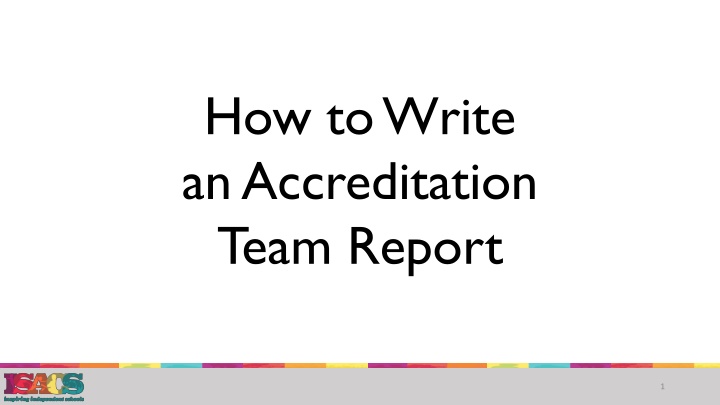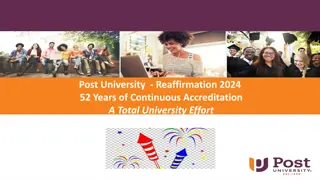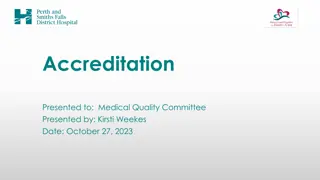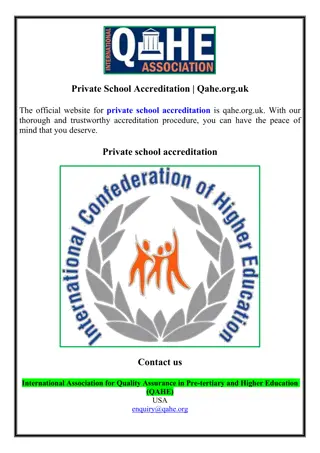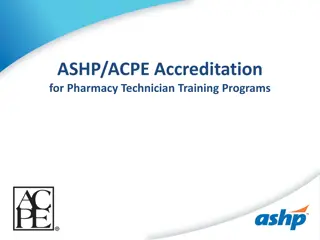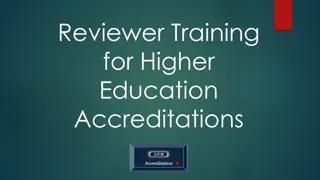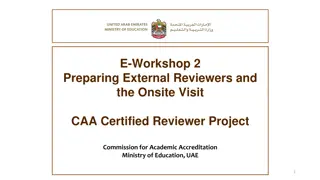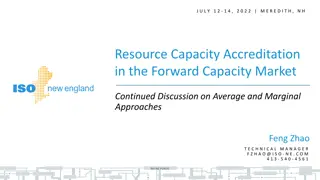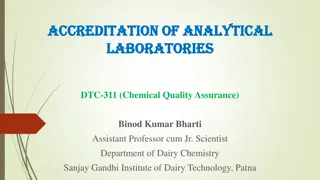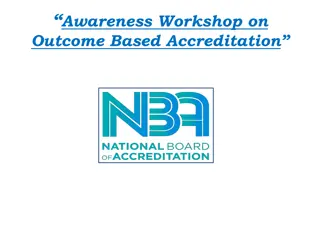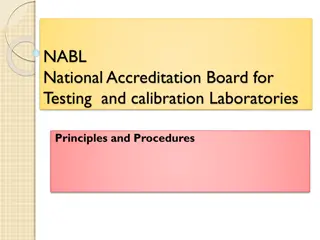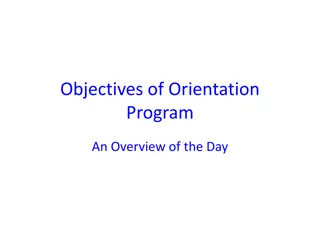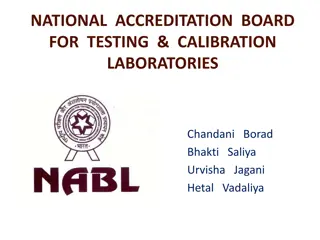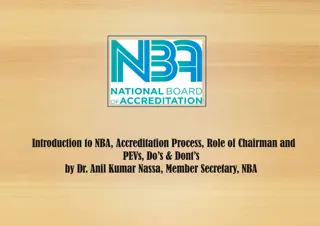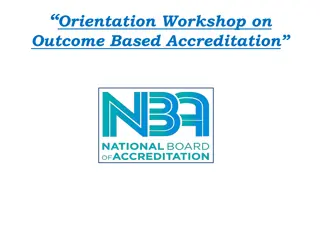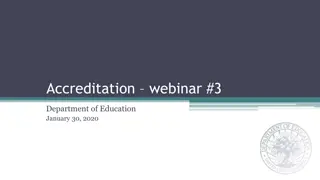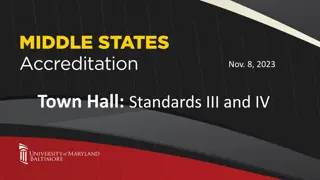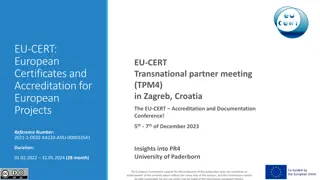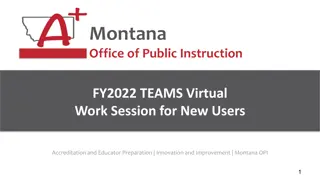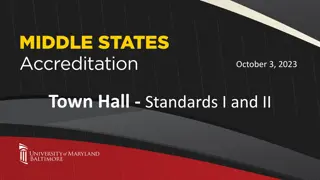Writing an Accreditation Team Report
Accreditation Team Reports play a vital role in school accreditation processes, offering insights and recommendations for continuous improvement. Learn how to craft a concise and effective report based on peer review guidelines.
Download Presentation

Please find below an Image/Link to download the presentation.
The content on the website is provided AS IS for your information and personal use only. It may not be sold, licensed, or shared on other websites without obtaining consent from the author.If you encounter any issues during the download, it is possible that the publisher has removed the file from their server.
You are allowed to download the files provided on this website for personal or commercial use, subject to the condition that they are used lawfully. All files are the property of their respective owners.
The content on the website is provided AS IS for your information and personal use only. It may not be sold, licensed, or shared on other websites without obtaining consent from the author.
E N D
Presentation Transcript
How to Write an Accreditation Team Report 1
Purpose and Audience The Accreditation Team Report is a document that serves the school in their accreditation work, reflecting what the visiting team has seen, read, and heard during the visit and providing recommendations for the school to implement throughout their continuous improvement planning. The Accreditation Team Report also serves as the peer review mechanism for the ISACS Accreditation Review Committee to make a determination regarding the school s accreditation status. 2
Overall Guidance Aim for brevity Write in the third person (the team as opposed to I or we Avoid references to specific individuals Be specific with respect to the desired outcome but do not prescribe the method the school must use to achieve the result 3
General Appraisal Provide the background for all that follows in the report and enough context so the reader understands the rationale for the recommendations that follow Commendations and recommendations should be foreshadowed in GA Can include matters of direct knowledge based on observations and conversations AND information included in the Self-Study Report Consists of a few paragraphs 4
Sample General Appraisal The Lake School aims to give its students the best preparation for life after high school. To that end, its course of study encompasses six major areas that, practiced together, develop in students core values of the school leadership, integrity, stewardship, courage, resilience, awareness, and interconnectedness. These curricula are as follows: 1) Academic Curriculum; 2) Learning Skills Curriculum; 3) Residential Curriculum; 4) Exploratory Curriculum; 5) Community Wellness Curriculum; and 6) Personal Wellness Curriculum. This report focuses on the Academic, Learning Skills, and Exploratory curricula, though it must be understood that the curricula within the student life program complete the Leelanau experience. Academic graduation requirements align with the State of Montana s Merit Curriculum. While this proficiency-based curriculum has specific credit requirements in foundational subject areas that are met by the school s academic program, it allows for modifications (such as acceleration or remediation) based on the individual learning needs of a student. In addition, the school offers a variety of electives and enrichment courses to round out a student s academic experience. Some syllabi make especially clear reference to the connections between content and the school s core values. Faculty communicate assignments and assessment results via the TeacherEase program, and some teachers make use of Google Classroom as well. Traditional letter grades are given in each course at the end of each semester, along with detailed feedback on students progress and areas of growth. The grade-level Learning Skills program fosters both academic and personal success. These required, ungraded classes focus on executive functioning, organization, study skills, self-awareness, communication skills, and self-advocacy. Coordination between the Learning Skills specialists and classroom teachers ensures that students understand the strategies most beneficial for their particular learning needs. Annual faculty evaluations begin with a self-evaluation in which teachers rate their alignment to professional norms that are reviewed and shared annually. The process involves self-reflection, goal setting, peer observation, and department head assessment of progress towards goals. These processes are overseen by the Provost with support from department heads. The school makes judicious use of its limited funding for formal professional development by bringing speakers to campus during pre-sessional meetings and allowing faculty and staff to request one-off activities. A committee that includes faculty and administrators approves professional- development requests. 5
Commendations Recognize the school for areas of perceived real strength, avoid meaningless platitudes Begin each commendation with a noun or noun prhase (or adjective) Usually 3-5 Commendations 6
Sample Commendations Ask the school to address matters related to the Standards for Membership Be specific with respect to the desired outcome but do not prescribe the method the school must use to achieve the result May be aspirational, and should also be within the school s potential to achieve Avoid requiring significant financial expenditure or changes in school structure or personnel (unless already indicated by the school) Begin each recommendation with a verb 7
Recommendations Ask the school to address matters related to the Standards for Membership Be specific with respect to the desired outcome but do not prescribe the method the school must use to achieve the result May be aspirational, and should also be within the school s potential to achieve Avoid requiring significant financial expenditure or changes in school structure or personnel (unless already indicated by the school) Begin each recommendation with a verb 8
Sample Recommendations The ISACS visiting team recommends that The Lake School: 1. Define a clear scope and sequence of core academic skills and content, along with expectations for mastery, needed for success at the post-secondary level. 2. Investigate methods for assessment and grading that allow a more authentic presentation of student mastery and accomplishment outside of academic courses e.g., standards- based grading or a mastery-based transcript. 3. Standardize method of communicating assignments and course materials to students (e.g., Google Classroom). 9
Additional Tips Start writing early when you receive the Self-Study Report, outline your General Appraisal and identify who you will be observing/interviewing Use peer editing swap reports with another team member for proofreading and feedback Ask for help if others at your school have served on teams, ask them about their experiences and strategies 10
Purpose and Audience The Accreditation Team Report is a document that serves the school in their accreditation work, reflecting what the visiting team has seen, read, and heard during the visit and providing recommendations for the school to implement throughout their continuous improvement planning. The Accreditation Team Report also serves as the peer review mechanism for the ISACS Accreditation Review Committee to make a determination regarding the school s accreditation status.
Overall Guidance Aim for brevity Write in the third person (the team as opposed to I or we Avoid references to specific individuals Be specific with respect to the desired outcome but do not prescribe the method the school must use to achieve the result
General Appraisal Provide the background for all that follows in the report and enough context so the reader understands the rationale for the recommendations that follow Commendations and recommendations should be foreshadowed in GA Can include matters of direct knowledge based on observations and conversations AND information included in the Self-Study Report Consists of a few paragraphs
Sample General Appraisal The Lake School aims to give its students the best preparation for life after high school. To that end, its course of study encompasses six major areas that, practiced together, develop in students core values of the school leadership, integrity, stewardship, courage, resilience, awareness, and interconnectedness. These curricula are as follows: 1) Academic Curriculum; 2) Learning Skills Curriculum; 3) Residential Curriculum; 4) Exploratory Curriculum; 5) Community Wellness Curriculum; and 6) Personal Wellness Curriculum. This report focuses on the Academic, Learning Skills, and Exploratory curricula, though it must be understood that the curricula within the student life program complete the Leelanau experience. Academic graduation requirements align with the State of Montana s Merit Curriculum. While this proficiency-based curriculum has specific credit requirements in foundational subject areas that are met by the school s academic program, it allows for modifications (such as acceleration or remediation) based on the individual learning needs of a student. In addition, the school offers a variety of electives and enrichment courses to round out a student s academic experience. Some syllabi make especially clear reference to the connections between content and the school s core values. Faculty communicate assignments and assessment results via the TeacherEase program, and some teachers make use of Google Classroom as well. Traditional letter grades are given in each course at the end of each semester, along with detailed feedback on students progress and areas of growth. The grade-level Learning Skills program fosters both academic and personal success. These required, ungraded classes focus on executive functioning, organization, study skills, self-awareness, communication skills, and self-advocacy. Coordination between the Learning Skills specialists and classroom teachers ensures that students understand the strategies most beneficial for their particular learning needs. Annual faculty evaluations begin with a self-evaluation in which teachers rate their alignment to professional norms that are reviewed and shared annually. The process involves self-reflection, goal setting, peer observation, and department head assessment of progress towards goals. These processes are overseen by the Provost with support from department heads. The school makes judicious use of its limited funding for formal professional development by bringing speakers to campus during pre- sessional meetings and allowing faculty and staff to request one-off activities. A committee that includes faculty and administrators approves professional-development requests.
Commendations Recognize the school for areas of perceived real strength, avoid meaningless platitudes Begin each commendation with a noun or noun prhase (or adjective) Usually 3-5 Commendations
Sample Commendations The ISACS visiting team commends The Lake School for its: 1. Learning Skills program, which so nimbly and thoughtfully supports all students in their personal and academic growth. 2. Creative and dedicated faculty who by virtue of an intentionally crafted student experience are deeply involved with students lives beyond the classroom. 3. Institutional understanding that caring student-teacher relationships are the basis of all successful learning. 4. Ability to offer a range of course offerings that tap both the expertise of the faculty and the interests of the students.
Recommendations Ask the school to address matters related to the Standards for Membership Be specific with respect to the desired outcome but do not prescribe the method the school must use to achieve the result May be aspirational, and should also be within the school s potential to achieve Avoid requiring significant financial expenditure or changes in school structure or personnel (unless already indicated by the school) Begin each recommendation with a verb
Sample Recommendations The ISACS visiting team recommends that The Lake School: 1. Define a clear scope and sequence of core academic skills and content, along with expectations for mastery, needed for success at the post-secondary level. 2. Investigate methods for assessment and grading that allow a more authentic presentation of student mastery and accomplishment outside of academic courses e.g., standards- based grading or a mastery-based transcript. 3. Standardize method of communicating assignments and course materials to students (e.g., Google Classroom).
Additional Tips Start writing early when you receive the Self-Study Report, outline your General Appraisal and identify who you will be observing/interviewing Use peer editing swap reports with another team member for proofreading and feedback Ask for help if others at your school have served on teams, ask them about their experiences and strategies
